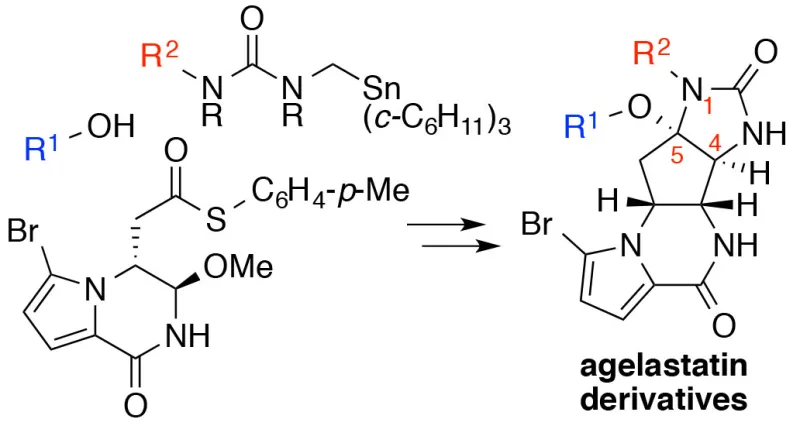Potent Agelastatin Derivatives as Modulators for Cancer Invasion and Metastasis
This technology is a panel of agelastatin derivatives with applications as cancer anti-metastasis therapeutics.
Researchers
-
potent agelastatin derivatives as modulators for cancer invasion and metastasis
United States of America | Granted | 11,932,650
Figures
Technology
This technology is a panel of agelastatin A (AgA) and agelastatin E (AgE) derivatives with anti-metastatic properties. AgA and AgE block metastasis by abrogating Tiam1-osteopontin induced epithelial to mesenchymal transition (EMT), which is a key step in the metastasis of many cancers. These inventors demonstrated that AgA and AgE derivatives are highly effective in preventing breast cancer migration in in vivo assays at concentrations far below levels that are cytotoxic. In mouse breast cancer xenotransplantation studies AgA and AgE have no effect on primary tumor growth; however, strikingly, they block nearly all metastatic spread. Importantly, osteopontin has a pro-metastatic role in many other cancer types, suggesting that AgA/E may be generalizable anti-metastasis drugs for other cancer indications. The pre-clinical data all indicate that AgA and AgE are promising anti-metastasis drug candidates.
Problem Addressed
An estimated 90% of cancer deaths are due to tumor metastasis, which is the dissemination of tumor cells from the primary tumor site to distant organs and tissues. Despite the fact that metastasis is the primary driver of cancer mortality, there has been very little drug development targeting metastasis inhibition, and there is only one FDA approved anti-metastasis drug on the market today. There is therefore a significant unmet need to develop drugs that block metastatic dissemination of cancer cells.
Advantages
- Anti-metastasis drug candidates
- Promising in vitro and in vivo pre-clinical data indicating effective metastasis inhibition
- No toxicity at effective doses in vitro or in vivo
- Potentially generalizable to other cancer types in addition to breast cancer
Publications
Antropow, A.H., Xu, K., Buchsbaum, R.J., Movassaghi, M. (2017). Synthesis and Evaluation of Agelastatin Derivatives as Potent Modulators for Cancer Invasion and Metastasis. The Journal of Organic Chemistry, 82(15), 7720-7731. doi: 10.1021/acs.joc.7b01162.
Xu, K., Tian, X., Oh, S.Y., et al. (2016). The fibroblast Tiam1-osteopontin pathway modulates breast cancer invasion and metastasis. Breast Cancer Research, 18, 14. doi: 10.1186/s13058-016-0674-8.
License this technology
Interested in this technology? Connect with our experienced licensing team to initiate the process.
Sign up for technology updates
Sign up now to receive the latest updates on cutting-edge technologies and innovations.
